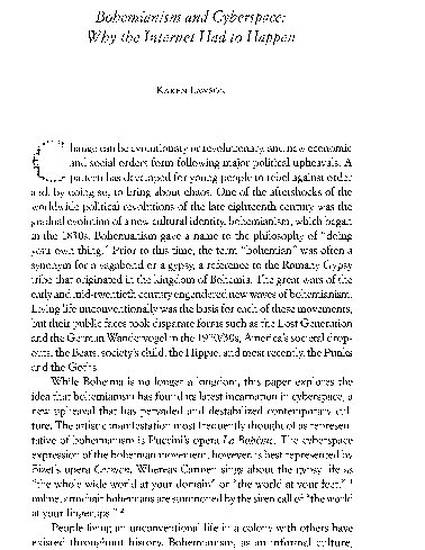
Article
Bohemianism and Cyberspace: Why the Internet Had to Happen
The Journal of Graduate Liberal Studies
Document Type
Article
Disciplines
Publication Date
4-1-2002
Abstract
Change can be evolutionary or revolutionary, and new economic and social orders form following major political upheavals. A pattern has developed for young people to rebel against order and, by doing so, to bring about chaos. One of the aftershocks of the worldwide political revolutions of the late eighteenth century was the gradual evolution of a new cultural identity, bohemianism, which began in the 1830s. Bohemianism gave a name to the philosophy of "doing your own thing." Prior to this time, the term "bohemian" was often a synonym for a vagabond or a gypsy, a reference to the Romany Gypsy tribe that originated in the kingdom of Bohemia. The great wars of the early and mid-twentieth century engendered new waves ofbohemianism. Living life unconventionally was the basis for each of these movements, but their public faces took disparate forms such as the Lost Generation and the German Wandervogel in the 1920/30s, America's societal dropouts, the Beats, society's child, the Hippie, and most recently, the Punks and the Goths.
Copyright Owner
The Association of Graduate Liberal Studies Programs
Copyright Date
2002
Language
en
File Format
application/pdf
Citation Information
Karen G. Lawson. "Bohemianism and Cyberspace: Why the Internet Had to Happen" The Journal of Graduate Liberal Studies Vol. VII Iss. 2 (2002) p. 69 - 83 Available at: http://works.bepress.com/karen_lawson/15/

This article is from The Journal of Graduate Liberal Studies VII, no. 2 (Spring 2002): 69–83.